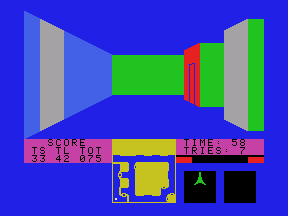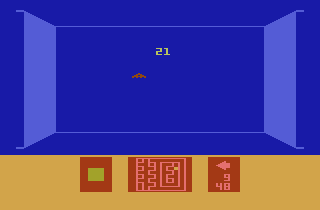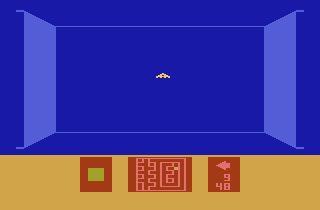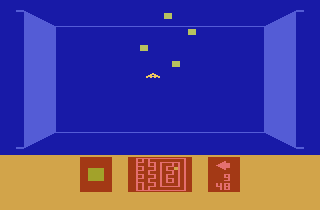Retro Replay Review
Gameplay
Escape from the Mindmaster throws players into a series of six increasingly intricate mazes, each designed to test different facets of your skills. From the very first labyrinth, you’ll scurry through winding corridors hunting for colored, shaped pegs—and the matching holes to slot them into. The core loop of peg-collecting and hole-matching remains fresh thanks to a ticking clock: you start each maze with sixty points, and the countdown chips away at your total score, demanding swift decision-making under pressure.
(HEY YOU!! We hope you enjoy! We try not to run ads. So basically, this is a very expensive hobby running this site. Please consider joining us for updates, forums, and more. Network w/ us to make some cash or friends while retro gaming, and you can win some free retro games for posting. Okay, carry on 👍)
Adding tension to the puzzle-solving is the Alien Stalker, a roaming adversary whose proximity you monitor by an ever-accelerating beep. If he catches you, you lose one of your limited chances, as do you if you brush against lethal force fields starting in Maze Two. One-way doors in Mazes Four through Six introduce branching pathways that become traps if you backtrack, forcing you to plan routes carefully and learn layouts by heart.
To earn bonus points, each maze (except the last) features a unique skill test. You’ll dodge falling bricks in an agility challenge, follow flashing arrows for recall tests, and even pilot a lander onto a platform with minimal fuel. These mini-games break the monotony of the main puzzles and reward focused performance, though they also drain precious time from your 60-point clock. Survive all mazes or lose all chances, and you’ll see the Mindmaster’s final judgment—an amusing flourish that caps off your performance and teases replayability.
Graphics
Being an Atari 2600 title, Escape from the Mindmaster relies on blocky sprites and a limited palette, yet it uses these constraints to its advantage. Each maze is rendered in contrasting colors to distinguish walls, force fields, and doors, keeping navigation clear despite the system’s hardware limitations. The pegs and holes are brightly colored and simple in shape, ensuring you won’t confuse which peg goes where when the clock is ticking.
The Alien Stalker’s design is minimalist—a few moving pixels and a changing beep rate—but it remains unnerving each time it closes in. Force fields shimmer in static colors, making them easily avoidable once you learn their patterns. One-way doors are represented as distinct openings in the walls, and their permanence adds weight to every decision, highlighted by the stark, angular graphics.
Sound effects are equally essential: short beeps track the stalker’s distance, a confirmation tone plays when you slot a peg into its hole, and a sharp buzzer heralds your loss of a chance. While these sounds are simple, they’re crisply produced and vital for gameplay feedback. The retro audiovisual package may feel primitive by modern standards, but it delivers character and purpose in every bleeps and blocks.
Story
The narrative premise of Escape from the Mindmaster is delightfully over-the-top: you’ve been abducted by an enigmatic “Mindmaster” who uses you as a guinea pig to appraise human intelligence and dexterity. Though the story unfolds mostly in a few introductory lines, it sets a playful, sci-fi atmosphere where the fate of humanity hinges on your performance. This narrative framing elevates the puzzles from rote tasks into a grand test of worthiness.
Each maze serves as a new “trial,” with the Mindmaster’s unseen presence looming over every corridor. The final maze offers a glimpse of narrative payoff in the form of a personalized assessment of your capabilities, followed by the Mindmaster’s verdict on the human race. While there are no cutscenes or dialogue to advance the plot, the premise shines through in every hazard and skill test, lending purpose to each obstacle.
Though Escape from the Mindmaster doesn’t weave a deep or branching storyline, its simple sci-fi hook is memorable and effective, especially for fans of retro gaming. The emphasis remains squarely on gameplay mechanics, but the light narrative gloss ensures you always feel like part of a larger experiment, rather than just navigating empty mazes.
Overall Experience
Escape from the Mindmaster strikes a rewarding balance between mental puzzles, dexterity tests, and stealth-like evasion. The gradual introduction of new hazards keeps each level feeling fresh, and the skill tests inject variety that breaks up repetitive peg-matching. Time pressure and a limited number of lives create palpable tension, leading to satisfying “aha” moments when you master a tricky maze layout or skill challenge.
The game’s learning curve is well paced: early mazes teach basic mechanics, while later levels demand strategic planning around one-way doors and force fields. Difficulty switches on the Atari 2600 allow you to tweak both your number of chances and the stalker’s speed, making the game accessible for newcomers and hardcore vintage gamers alike. Speedrunners may appreciate the tight scoring formula and room for optimization.
Though graphics and sound are primitive by today’s standards, they serve their gameplay roles effectively and carry a nostalgic charm. The minimal story framework suffices to keep you invested in each trial, and the final Mindmaster evaluation provides a neat reward for your efforts. Overall, Escape from the Mindmaster offers a uniquely challenging Atari experience that will appeal to puzzle enthusiasts and retro aficionados looking for a fast-paced test of skill and wits.
 Retro Replay Retro Replay gaming reviews, news, emulation, geek stuff and more!
Retro Replay Retro Replay gaming reviews, news, emulation, geek stuff and more!









Reviews
There are no reviews yet.